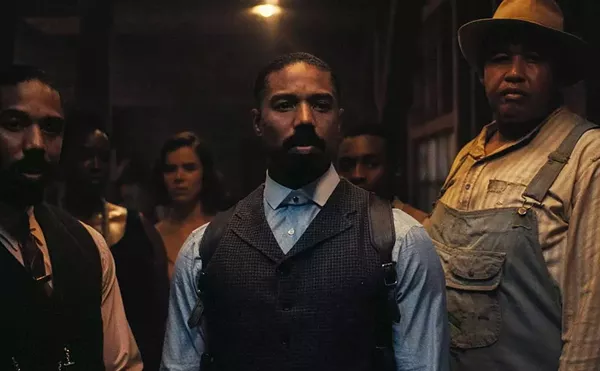
Audio By Carbonatix
[
{
"name": "GPT - Leaderboard - Inline - Content",
"component": "35519556",
"insertPoint": "5th",
"startingPoint": "3",
"requiredCountToDisplay": "3",
"maxInsertions": 100,
"adList": [
{
"adPreset": "LeaderboardInline"
}
]
}
]
SWM, mid-40s, divorced, no kids, ISO guns. Big guns, little guns. Handguns, shotguns, rifles, machine guns, and, yeah, OK, grenade launchers and anti-tank weapons here and there along the way.
Meet Burdon Lane, executive vice president of UniArms Incorporated, Alexandria, Va. A real dreamboat if you’re a Soldier of Fortune kind of gal. Or you’re a gangbanger in need of high-powered ordnance to make sure your deals go down real smooth. Lane is our guide through the wonderfully absurd world of gunrunning portrayed in this first novel by Washington, D.C., attorney Douglas E. Winter.
The plot is straight out of Screenwriting 101, Die Hard University. We join Mr. Lane as he’s orchestrating a gun deal with a posse of New York homies. Along for the ride is a local D.C. gang, the U Street Crew, and Lane’s surly cohort, CK, who cooked up the whole project.
In New York, things go terribly awry, as is their wont. Just 10 floors below the hotel room where the deal is going down, a prominent civil rights leader, the Rev. Gideon Parks, is holding a peace vigil on the steps of a cathedral. Shots ring out in the street and the hotel room. The Reverend is down and Lane is on the run with Jinx, the only surviving member of the U Street contingent.
Surely this book would find a welcome place on the nightstands of Charlton Heston and Wayne LaPierre. Winter knows his guns and loves to let his protagonist rhapsodize pornographically about them in a relentless, hard-boiled monotone. Lane is a sort of NRA poster boy – a self-made, blue-collar guy struggling with his anomie toward the stifling suburbs and the Democratic government that panders to soccer moms and the sensitive men who love them. Not that Lane isn’t sensitive; his trigger finger is a portrait of edginess.
Then again, Chuck and Wayne might not enjoy finishing their day with Mr. Winter. Because by the middle of this crisply written story, we discover that the gun orgy is a Trojan horse for a liberal screed against guns and all their attendant ruin. There’s a method to Winter’s madness of overkill and it’s called allegory.
Winter packs his book with inflections to icons of America’s social travails from 1960 onward – JFK to MLK to OJ to CNN. A big statement is being made. If the Second Amendment is his target, the author uses the First Amendment as his weapon of choice, political correctness be damned. In crime fiction, language is key to character, marking who can or can’t walk the talk on either side of the law. Or the color divide, for that matter.
Indeed, as this is an American urban bucolic, the n-word gets a very heavy workout, used in all its variations and connotations. For Winter, the theater of gunrunning thrives on a dick-swinging, cartoon negritude: Lane and friends galvanize their honky swagger with an awkward hybrid of coptalk and third-hand homestyling jive; and the brothers ratchet up the "Rap City" clichés to show up the honkies who look down their noses at them. Everyone must get his props, with or without irony.
But why would a good champagne socialist take on race without also wagging a finger at issues of class? So the U Street Crew emerges as nascent Black Panthers, fighting against the white devil with his own guns. When Lane shows up with Jinx at the crew’s crib, the head man, a badass called Doctor D., is not much of a host. Two pages and an explosion later, they’re in a secret warehouse full of guns and the good doctor wants to lay a bit of righteous erudition on his white compadre:
Look around you. This ain’t the capital of the USA, this is fuckin Beirut. Woke up here one day, I was twelve years old, listenin to my grammie tell me to go on to school and walkin round the projects and comin home and watchin that TV instead. That’s what did me in. The mothafuckin TV. But it wasn’t the crime, the violence, all the shootin on the TV that did me. It was the shit between the shootin, man, the pictures of the stuff, all the toys, all the cars, all the pretty girls and all the shit I didn’t have, wasn’t never gonna have.
Of course. Reverend Parks didn’t die because he opposed guns outright; rather, he was killed for leading blacks away from the drugs and consumer false consciousness that give everlasting life to the gun industry.
The pamphleteering relents in order for the plot to race on toward the extravagant finale in a church that will no doubt look great, if somewhat ludicrous, on the big screen. Bruce Willis’ agent must already be salivating at the thought of his client in the lead role.
For a book so long on heart, Run is criminally short on nuance. But considering the nature of the gun debate, woe to the man who shows up with anything less than a big piece of heat.





